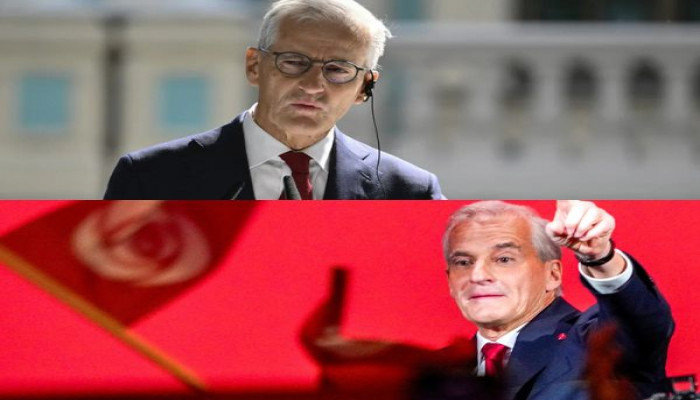Norway's ruling Labour Party wins general election
- In Reports
- 05:29 PM, Sep 09, 2025
- Myind Staff
Norway's left-wing bloc, led by Prime Minister Jonas Gahr Store won Monday's parliamentary elections, which also saw a record surge in support for the anti-immigration Progress Party.
Store, who became prime minister in 2021, is expected to continue leading a minority Labour government with the support of the four other left-leaning parties.
The election campaign in the wealthy country of 5.6 million people was driven mainly by domestic concerns but also shaped by global issues, including US President Donald Trump's policies and the war in Ukraine.
With nearly all ballots counted, Norway's five-party left-wing bloc secured a slim majority of 87 out of 169 seats in parliament, compared to 82 seats for the right-wing bloc.
"We knew it would be close, and it was. We knew we'd have to give it our all, and we gave it our all... We did it," the 65-year-old leader said at an election night rally after his Labour Party came out on top with around 28 per cent of the votes.
The election also saw record gains for the anti-immigration and anti-establishment Progress Party, which doubled its tally from the 2021 vote.
With significant backing from younger voters, especially men, the party rose to become the main opposition force with about 24 per cent of votes, overtaking former prime minister Erna Solberg's Conservative Party, which fell to its worst result in two decades with 14.6 per cent.
"Tonight, we are going to celebrate the best score in our history, and my goal is for this to be just the beginning," Progress Party leader Sylvi Listhaug said.
While she congratulated Store on his victory, she warned that the next four years would be "difficult for the people and the business world".
The campaign focused heavily on purchasing power, healthcare, inequality, public services and taxes.
In recent years, several wealthy Norwegians have moved to Switzerland to avoid wealth tax, and the two sides clashed over whether the tax should remain or be scrapped.
"What really has been a concern for people is their daily situation in their personal economy, how to cope with increasing prices," Store told reporters after casting his ballot with his wife at an Oslo school earlier in the day.
Listhaug told broadcaster TV2, "Do we want to continue as before, spending more and maintaining very high taxes without getting more for our money than neighbouring countries, or do we want to take back control and stop the waste?"
Just a few months ago, Store seemed politically weakened, with speculation even raised about his possible replacement.
But with his long political experience as prime minister and former foreign minister, he benefited from voters’ perception of a need for stability after global disruptions caused by Trump’s policies, such as tariffs, and by the war in Ukraine, political scientist Johannes Bergh told AFP.
Norway, which is not an EU member but part of NATO, shares a border with Russia in the Arctic and relies heavily on exports for its economy.
Store, also gained domestic momentum earlier this year with the return of popular ex-NATO chief Jens Stoltenberg as finance minister.
Labour will need informal parliamentary support from the Centre Party, the Greens, the Socialist Left and the communist Red Party.
But uniting all these groups will be a challenge.
Labour supports the continuation of oil drilling that has fuelled Norway’s prosperity, but some of its allies want to gradually wind down oil activities.
The Socialist Left leader Kirsti Bergsto has already warned that her party’s influence meant that "we will not open the deep seas up to mining", and there would be "new reductions in emissions" of greenhouse gases.
On foreign policy, Labour and the Greens support maintaining close relations with the EU, while the other left-wing parties remain strongly opposed.
The far left also wants Norway's sovereign wealth fund, the world’s largest, to withdraw its investments from Israel, a proposal Labour rejects.







Comments